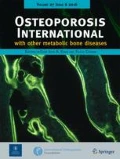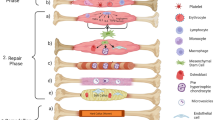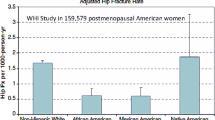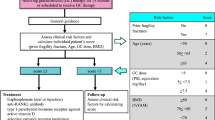Abstract
About 50% of patients fail to comply or persist with anti-osteoporosis treatment regimens within 1 year. Poor compliance is associated with higher fracture rates. Causes of poor compliance are unknown. As it is not possible to predict poor compliance, close monitoring of compliance is needed. Despite evidence supporting the anti-fracture efficacy of several pharmacological agents, approximately 50% of patients do not follow their prescribed treatment regimen and/or discontinue treatment within 1 year. Poor compliance is associated with higher fracture rates and increased morbidity, mortality and cost. However, as poor compliance, even to placebo, is associated with adverse outcomes, the higher morbidity appears to be only partly the result of lack of treatment: as yet, undefined characteristics place poor compliers at higher risk of morbidity and mortality. Only a small proportion (e.g., 6%) of the variability in compliance is explained by putative causal factors such as older age, co-morbidity or greater number of medications. Regimens with longer dosing intervals, such as weekly dosing, improve compliance, persistence and outcomes, but only modestly. As it is not possible to predict poor compliance, close monitoring of compliance should be an obligatory duty in clinical care. How this is best achieved has yet to be established, but poor persistence occurs as early as 3 months of starting treatment, indicating the need for early monitoring.



Similar content being viewed by others
References
Kanis JA, Johnell O, Oden A et al (2000) Long-term risk of osteoporotic fracture in Malmo. Osteoporos Int 11:669–674
Zethraeus N, Stromberg L, Jönsson B et al (1997) The cost of a hip fracture. Estimates for 1,709 patients in Sweden. Acta Orthop Scand 68:13–17
Zethraeus N, Gerdtham UG (1998) Estimating the costs of hip fracture and potential savings. Int J Technol Assess Health Care 14:255–267
Borgstrom F, Zethraeus N, Johnell O et al (2006) Costs and quality of life associated with osteoporosis-related fractures in Sweden. Osteoporos Int 17:637–650
Adachi JD, Ioannidis G, Olszynski WP et al (2002) The impact of incident vertebral and non-vertebral fractures on health related quality of life in postmenopausal women. BMC Musculoskelet Disord 3:11
Schwenkglenks M, Lippuner K, Hauselmann HJ et al (2005) A model of osteoporosis impact in Switzerland 2000–2020. Osteoporos Int 16:659–671
Delmas PD (2002) Treatment of postmenopausal osteoporosis. Lancet 359:2018–2026
Fleurence RL, Iglesias CP, Torgerson DJ (2006) Economic evaluations of interventions for the prevention and treatment of osteoporosis: a structured review of the literature. Osteoporos Int 17:29–40
Sornay-Rendu E, Munoz F, Garnero P et al (2005) Identification of osteopenic women at high risk of fracture: the OFELY study. J Bone Miner Res 20:1813–1819
Garnero P, Munoz F, Borel O et al (2005) Vitamin D receptor gene polymorphisms are associated with the risk of fractures in postmenopausal women, independently of bone mineral density. J Clin Endocrinol Metab 90:4829–4835
Laupacis A, Sackett DL, Roberts RS (1988) An assessment of clinically useful measures of the consequences of treatment. N Engl J Med 318:1728–1733
Boutroy S, Bouxsein ML, Munoz F et al (2005) In vivo assessment of trabecular bone microarchitecture by high-resolution peripheral quantitative computed tomography. J Clin Endocrinol Metab 90:6508–6515
Nguyen TV, Center JR, Eisman JA (2004) Osteoporosis: underrated, underdiagnosed and undertreated. Med J Aust 180:S18–S22
Delmas PD, van de Langerijt L, Watts NB et al (2005) Underdiagnosis of vertebral fractures is a worldwide problem: the IMPACT study. J Bone Miner Res 20:557–563
Vestergaard P, Rejnmark L, Mosekilde L (2005) Osteoporosis is markedly underdiagnosed: a nationwide study from Denmark. Osteoporos Int 16:134–141
Cramer JA, Spilker B (1991) Overview of methods to measure and enhance patient compliance. In: Cramer JA, Spilker B (eds) (1991) Patient Compliance in Medical Practice and Clinical Trials. Lippincott, Williams and Wilkins, New York, pp 3–10
Cramer J (2006) ISPOR Medication Compliance and Persistence Special Interest Group (MCP). Available at: http://www.ispor.org/sigs/medication.asp. Accessed 3 August 2006
McCombs JS, Thiebaud P, McLaughlin-Miley C et al (2004) Compliance with drug therapies for the treatment and prevention of osteoporosis. Maturitas 48:271–287
Caro JJ, Ishak KJ, Huybrechts KF et al (2004) The impact of compliance with osteoporosis therapy on fracture rates in actual practice. Osteoporos Int 15:1003–1008
Huybrechts KF, Ishak KJ, Caro JJ (2006) Assessment of compliance with osteoporosis treatment and its consequences in a managed care population. Bone 38:922–928
Solomon DH, Avorn J, Katz JN et al (2005) Compliance with osteoporosis medications. Arch Intern Med 165:2414–2419
Recker RR, Gallagher R, MacCosbe PE (2005) Effect of dosing frequency on bisphosphonate medication adherence in a large longitudinal cohort of women. Mayo Clin Proc 80:856–861
Cramer JA, Amonkar MM, Hebborn A et al (2005) Compliance and persistence with bisphosphonate dosing regimens among women with postmenopausal osteoporosis. Curr Med Res Opin 21:1453–1460
Papaioannou A, Ioannidis G, Adachi JD et al (2003) Adherence to bisphosphonates and hormone replacement therapy in a tertiary care setting of patients in the CANDOO database. Osteoporos Int 14:808–813
Lo JC, Pressman AR, Omar MA et al (2006) Persistence with weekly alendronate therapy among postmenopausal women. Osteoporos Int 17:922–928
Siris ES, Harris ST, Rosen CJ et al (2006) Adherence to bisphosphonate therapy and fracture rates in osteoporotic women: relationship to vertebral and nonvertebral fractures from 2 US claims databases. Mayo Clin Proc 81:1013–1022
Steiner JF, Prochazka AV (1997) The assessment of refill compliance using pharmacy records: methods, validity, and applications. J Clin Epidemiol 50:105–116
Yood RA, Emani S, Reed JI et al (2003) Compliance with pharmacologic therapy for osteoporosis. Osteoporos Int 14:965–968
Anon (1980) Influence of adherence to treatment and response of cholesterol on mortality in the coronary drug project. N Engl J Med 303:1038–1041
Horwitz RI, Viscoli CM, Berkman L et al (1990) Treatment adherence and risk of death after a myocardial infarction. Lancet 336:542–545
Becker MH, Maiman LA (1975) Sociobehavioral determinants of compliance with health and medical care recommendations. Med Care 13:10–24
Jackson RD, LaCroix AZ, Gass M et al (2006) Calcium plus vitamin D supplementation and the risk of fractures. N Engl J Med 354:669–683
Finkelstein JS (2006) Calcium plus vitamin D for postmenopausal women-bone appétit? N Engl J Med 354:750–752
McIntosh J, Blalock SJ (2005) Effects of media coverage of Women’s Health Initiative study on attitudes and behavior of women receiving hormone replacement therapy. Am J Health Syst Pharm 62:69–74
Ettinger B, Pressman A, Silver P (1999) Effect of age on reasons for initiation and discontinuation of hormone replacement therapy. Menopause 6:282–289
Feldstein AC, Nichols GA, Elmer PJ et al (2003) Older women with fractures: patients falling through the cracks of guideline-recommended osteoporosis screening and treatment. J Bone Joint Surg Am 85:A:2294–A2302
Segal E, Tamir A, Ish-Shalom S (2003) Compliance of osteoporotic patients with different treatment regimens. Isr Med Assoc J 5:859–862
Vestergaard P, Hermann AP, Gram J et al (1997) Improving compliance with hormonal replacement therapy in primary osteoporosis prevention. Maturitas 28:137–145
Resnick B, Wehren L, Orwig D (2003) Reliability and validity of the self-efficacy and outcome expectations for osteoporosis medication adherence scales. Orthop Nurs 22:139–147
Robbins B, Rausch KJ, Garcia RI et al (2004) Multicultural medication adherence: a comparative study. J Gerontol Nurs 30:25–32
Ryan PJ, Harrison R, Blake GM et al (1992) Compliance with hormone replacement therapy (HRT) after screening for post menopausal osteoporosis. Br J Obstet Gynaecol 99:325–328
Turbi C, Herrero-Beaumont G, Acebes JC et al (2004) Compliance and satisfaction with raloxifene versus alendronate for the treatment of postmenopausal osteoporosis in clinical practice: an open-label, prospective, nonrandomized, observational study. Clin Ther 26:245–256
Zafran N, Liss Z, Peled R et al (2005) Incidence and causes for failure of treatment of women with proven osteoporosis. Osteoporos Int 16:1375–1383
Zanchetta JR, Hakim C, Lombas C (2004) Observational study of compliance and continuance rates of raloxifene in the prevention and treatment of osteoporosis. Curr Ther Res 65:470–480
den Tonkelaar I, Oddens BJ (2000) Determinants of long-term hormone replacement therapy and reasons for early discontinuation. Obstet Gynecol 95:507–512
Solomon DH, Brookhart MA, Gandhi TK et al (2004) Adherence with osteoporosis practice guidelines: a multilevel analysis of patient, physician, and practice setting characteristics. Am J Med 117:919–924
Emkey R, Koltun W, Beusterien K et al (2005) Patient preference for once-monthly ibandronate versus once-weekly alendronate in a randomized, open-label, cross-over trial: the Boniva Alendronate Trial in Osteoporosis (BALTO). Curr Med Res Opin 21:1895–1903
Cooper A, Drake J, Brankin E et al (2006) Treatment persistence with once-monthly ibandronate and patient support vs. once-weekly alendronate: results from the PERSIST study. Int J Clin Pract 60:896–905
Clowes JA, Peel NF, Eastell R (2004) The impact of monitoring on adherence and persistence with antiresorptive treatment for postmenopausal osteoporosis: a randomized controlled trial. J Clin Endocrinol Metab 89:1117–1123
Delmas P, Vrijens B, Roux C et al (2004) Osteoporosis treatment using reinforcement with bone turnover marker data reduces fracture risk: The IMPACT Study. J Bone Miner Res 19:S444
Guilera M, Fuentes M, Grifols M et al (2006) Does an educational leaflet improve self-reported adherence to therapy in osteoporosis? The OPTIMA study. Osteoporos Int 17:664–671
Cuddihy MT, Amadio PC, Gabriel SE et al (2004) A prospective clinical practice intervention to improve osteoporosis management following distal forearm fracture. Osteoporos Int 15:695–700
Cost-effectiveness of the treatment and prevention of osteoporosis-a review of the literature and a reference model (2006) Submitted to Osteoporosis International
Zethraeus N, Ben Sedrine W, Caulin F et al (2002) Models for assessing the cost-effectiveness of the treatment and prevention of osteoporosis. Osteoporos Int 13:841–857
Johnell O, Jönsson B, Jonsson L et al (2003) Cost effectiveness of alendronate (fosamax) for the treatment of osteoporosis and prevention of fractures. Pharmacoeconomics 21:305–314
Borgstrom F, Johnell O, Jönsson B et al (2004) Cost effectiveness of alendronate for the treatment of male osteoporosis in Sweden. Bone 34:1064–1071
Borgstrom F, Jonsson B, Strom O et al (2005) An economic evaluation of strontium ranelate in the treatment of osteoporosis in a Swedish setting. Accepted for publication, Osteoporosis International
Borgstrom F, Carlsson Å, Sintonen H et al (2006) The cost-effectiveness of risedronate in the treatment of osteoporosis: an international perspective. Osteoporos Int 17:996–1007
Acknowledgements
This paper reports the conclusions from a meeting held in London on 14–15 October 2005 and supported by an unrestricted educational grant from GlaxoSmithKline and F.Hoffman-La Roche. The authors received honoraria from these companies. The authors gratefully acknowledge the editorial assistance provided by Glynis Davies of Complete HealthVizion.
Author information
Authors and Affiliations
Corresponding author
Rights and permissions
About this article
Cite this article
Seeman, E., Compston, J., Adachi, J. et al. Non-compliance: the Achilles' heel of anti-fracture efficacy. Osteoporos Int 18, 711–719 (2007). https://doi.org/10.1007/s00198-006-0294-8
Received:
Accepted:
Published:
Issue Date:
DOI: https://doi.org/10.1007/s00198-006-0294-8




